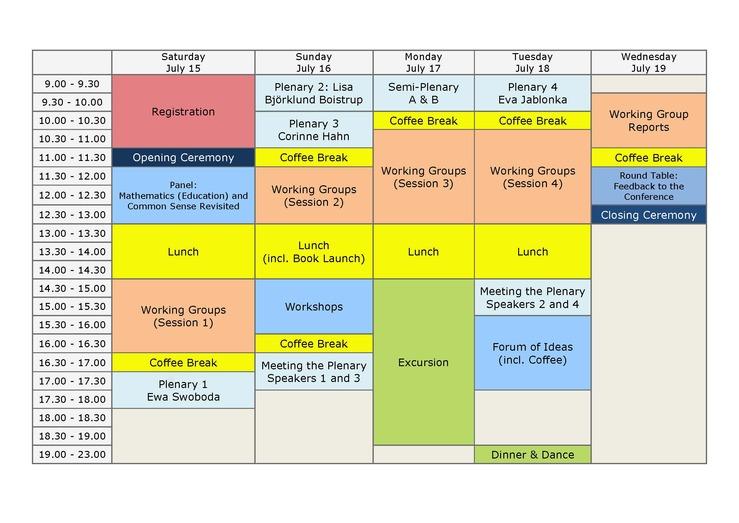Scientific Programme - Programme de la conference
Cliquez ici pour la version française
Conference Program

The program of the conference includes several activities:
- Panel
- Plenary and Semi-plenary Presentations
- Working groups
- Oral Presentations within the Working Groups
- Workshops
- Forum of ideas
- Special Sessions
- Official Languages of the Conference
The conference will be opened by a Panel Discussion in honor of Christine Keitel. (abstract)
Plenary and Semi-plenary Presentations
The programme includes plenary and semi-plenary sessions where invited speakers will focus on aspects of the conference theme. The plenaries and semi-plenaries provide a shared input to the conference and form a basis for discussions in the working groups.
The plenary speakers are:
Lisa Björklund Boistrup, Stockholms universitet, Sweden
- "Multimodality and mathematisation: Different communicational resources in relation to mathematisations within and outside the mathematics classroom“ (abstract)
Corinne Hahn, ESCP Europe, France
- "Development of didactic devices at the boundary of social worlds“ (abstract)
Eva Jablonka, Freie Universität Berlin, Germany
-
"Mathematisation in environments of Big Data – Implicit mathematics revisited" (abstract)
Ewa Swoboda, Uniwersytet Rzeszowski, Poland
- "Geometrisation as a didactic challenge" (abstract)
Working groups
Each participant is invited to be a member of one of the working groups that will meet several times. Working groups will focus on a specific sub-theme or on a number of interrelated themes. This will provide opportunities both for in-depth discussions and for the linking of experiences. These are planned as interactive sessions and are the heart of the conference. Some presentations may be included in these sessions but discussions and exchange of experiences and ideas are the essential aspects of this activity. Each group will be coordinated by two “animators”.
Oral Presentations within the Working Groups
Individuals or small groups of participants are encouraged to contribute to the conference through an oral presentation, thus communicating and sharing with others their ideas, research work or experiences. Relevant case studies are particularly welcome. Presentations should be related to the theme of the conference in general or to the subthemes. There will be between 15 and 20 minutes available for each presentation (depending on the organisation of the working group) followed by approximately 10 to 15 minutes for discussion.
Individuals or small groups of participants are also encouraged to prepare and organise workshops. These are a more extendedtype of contribution which should focus on concrete activities and encourage the active involvement of the participants through working on materials, problems or questions relating to the sub-themes. A workshop will last for about 90 min.
The Forum of Ideas offers an opportunity to present case studies, learning materials and research projects, as well as ideas that are not directly related to the theme. There will be a specific time for contributors to explain and discuss their work with fellow participants.
There will be two special sessions that will enrich the discussion. In one of these sessions, which is a panel, tribute is paid to Christine Keitel, former president of CIEAEM, by revisiting Mathematics (Education) and Common Sense.
Official Languages of the Conference
The official languages of the conference are French and English. The speakers need to prepare their slides in both languages, but, of course, each speaker chooses the language of presentation. We rely on and appreciate the help of those who can translate, to assist their colleagues within each working group. Animators in most cases are able to help in both languages.